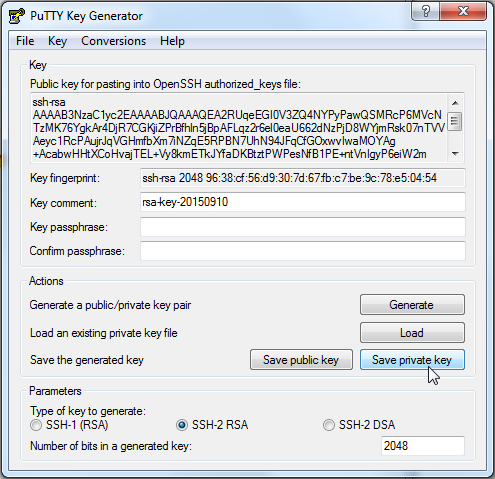Generate Private And Public Key Rsa
Generates a new RSA private key using the provided backend. Keysize describes how many bits long the key should be. Larger keys provide more security; currently 1024 and below are considered breakable while 2048 or 4096 are reasonable default key sizes for new keys. The publicexponent indicates what one mathematical property of the key generation will be.
The RSA public and private key are linked; it is not possible to generate new private keys that use the same public key. Since you need to trust the public key, it is not useful to generate new key pairs either. How to Generate SSH Public/Private Keys on Windows By Alexandru Andrei – Posted on Sep 17, 2019 Sep 17, 2019 in Windows If you ever managed a Linux server from Windows, you probably used PuTTY or at least heard about it. Aug 19, 2019 1. Start by logging into the source machine (local server) and creating a 2048-bit RSA key pair using the command. Ssh-keygen -t rsa. If you want to tighten up security measures, you can create a 4096-bit key by adding the -b 4096 flag. Ssh-keygen -t rsa -b 4096. That changes the meaning of the command from that of exporting the public key to exporting the private key outside of its encrypted wrapper. Inspecting the output file, in this case privateunencrypted.pem clearly shows that the key is a RSA private key as it starts with -BEGIN RSA PRIVATE KEY-. Visually Inspect Your Key Files. Nov 10, 2011 How to Generate A Public/Private SSH Key Linux 1. Open a terminal. In the next screen, you should see a prompt, asking you for the location to save the key. Next, you will be prompted to enter passphrase. Your public and private SSH key should now be generated. Save the public and private keys by clicking the Save public key and Save private key buttons. From the Public key for pasting into OpenSSH authorizedkeys file field at the top of the window, copy all the text (starting with ssh-rsa ) to your clipboard by pressing Ctrl-C.

Several tools exist to generate SSH public/private key pairs. The following sections show how to generate an SSH key pair on UNIX, UNIX-like and Windows platforms. /free-word-search-generator-with-answer-key.html.
Generating an SSH Key Pair on UNIX and UNIX-Like Platforms Using the ssh-keygen Utility
UNIX and UNIX-like platforms (including Solaris and Linux) include the ssh-keygen utility to generate SSH key pairs.
Pgp Key

Create Rsa Public Key
- Navigate to your home directory:
- Run the ssh-keygen utility, providing as
filenameyour choice of file name for the private key:The ssh-keygen utility prompts you for a passphrase for the private key.
- Enter a passphrase for the private key, or press Enter to create a private key without a passphrase:
Note:
While a passphrase is not required, you should specify one as a security measure to protect the private key from unauthorized use. When you specify a passphrase, a user must enter the passphrase every time the private key is used.
The ssh-keygen utility prompts you to enter the passphrase again.
- Enter the passphrase again, or press Enter again to continue creating a private key without a passphrase:
- The ssh-keygen utility displays a message indicating that the private key has been saved as
filenameand the public key has been saved asfilename.pub. It also displays information about the key fingerprint and randomart image.
Generating an SSH Key Pair on Windows Using the PuTTYgen Program
The PuTTYgen program is part of PuTTY, an open source networking client for the Windows platform.
Generate Private Key From Public Key Rsa
- Download and install PuTTY or PuTTYgen.
To download PuTTY or PuTTYgen, go to http://www.putty.org/ and click the You can download PuTTY here link.
- Run the PuTTYgen program.
- Set the Type of key to generate option to SSH-2 RSA.
- In the Number of bits in a generated key box, enter 2048.
- Click Generate to generate a public/private key pair.
As the key is being generated, move the mouse around the blank area as directed.
- (Optional) Enter a passphrase for the private key in the Key passphrase box and reenter it in the Confirm passphrase box.
Note:
/bb-flashback-pro-5-license-key-generator.html. While a passphrase is not required, you should specify one as a security measure to protect the private key from unauthorized use. When you specify a passphrase, a user must enter the passphrase every time the private key is used.
- Click Save private key to save the private key to a file. To adhere to file-naming conventions, you should give the private key file an extension of
.ppk(PuTTY private key).Note:
The.ppkfile extension indicates that the private key is in PuTTY's proprietary format. You must use a key of this format when using PuTTY as your SSH client. It cannot be used with other SSH client tools. Refer to the PuTTY documentation to convert a private key in this format to a different format. - Select all of the characters in the Public key for pasting into OpenSSH authorized_keys file box.
Make sure you select all the characters, not just the ones you can see in the narrow window. If a scroll bar is next to the characters, you aren't seeing all the characters.
- Right-click somewhere in the selected text and select Copy from the menu.
- Open a text editor and paste the characters, just as you copied them. Start at the first character in the text editor, and do not insert any line breaks.
- Save the text file in the same folder where you saved the private key, using the
.pubextension to indicate that the file contains a public key. - If you or others are going to use an SSH client that requires the OpenSSH format for private keys (such as the
sshutility on Linux), export the private key:- On the Conversions menu, choose Export OpenSSH key.
- Save the private key in OpenSSH format in the same folder where you saved the private key in
.ppkformat, using an extension such as.opensshto indicate the file's content.